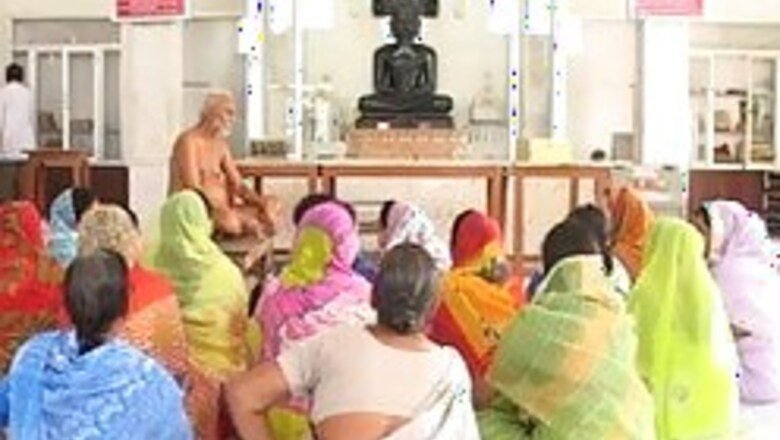
views
New Delhi: The Freedom of Religion (amendment) Bill 2006, which the Gujarat Assembly passed on Tuesday, has created a furore among Christians, Jains and Buddhists across the country.
Christians in the state are opposing the Bill because they believe will it alienate them further. Jains and Buddhists are angry for being bracketed with the Hindus.
They say it is very damaging to their identity.
While the Gujarat government is already under fire for being hostile to the minorities, the questions that everybody wants answers to are:
Is this law yet another political gimmick to consolidate the Hindutva vote and should Jains and Buddhist be classified as Hindus?
Gujarat BJP leader Jai Narayan Vyas said, "This is not a political gimmick to consolidate the Hindutva vote for the simple reason that Gujarat is not the first and the only state to pass the law. Other states like Orissa, Madhya Pradesh, Arunachal Pradesh, Tamil Nadu have passed the law before.”
The BJP, during the 2002 assembly elections, had promised that it would introduce a Bill to check religious conversions and therefore, according to Vyas, there was no reason for the hue and cry that the incident has led to.
Vyas defended the BJP by saying that the party were not stopping anyone from practising their religion. He said that the BJP was merely following what had already been said in the Constitution in clubbing together some religions.
"Go back to the Constitution. Sub-clause B of Clause 25 says that people who are practising Sikhs, Jains and Buddhists will be reffered to as Hindus," he said.
Vyas also hastened to explain that the amendment in no way meant that the BJP was converting people. He in fact stated that the BJP was following the law by not interfering with with the freedom of practising religion.
He also explained that the party was completely against conversions of any sort. "The Supreme Court has stated that there is no such thing as a 'fundamental right to convert any person to one’s own religion'. To this effect, the amended law definitely tries to curb conversion for people are converted from one religion to another through fraudulent means, force or some kinds of allurement," said Vyas.
Page Two: Critics of the Bill
PAGE_BREAK
Critic-speak
However, critics argue that the Bill is a direct attack on the minorities.
They say that this is nothing but part of a new Hindutva invented by the Gujarat BJP.
“This legislation is a fraud. The Gujarat BJP is trying to claim rights over Buddhist and Jains and excluding Christians and Muslims. This is an attempt to popularise Hindutva as a political creation,” says an eminent lawyer.
However, Vyas was quick to contradict saying that the 'new Hindutva' theory was merely a myth.
“Gujarat has a population of 89 per cent Hindus, around nine per cent Muslims and barely .56 per cent Christians. With these figures, it becomes obvious that these kinds of legislations are not being brought in to please or placate somebody,” he said.
The Jain reaction
Meanwhile, the Jains in Rajasthan, home to the biggest Jain population in the country, are not at all happy with the amendment made to the Bill.
They are not happy about being classified with Hindus and and have refused to accept the supremacy of the Hindu Vedas over the Tirthankars.
Secretary General of All India Jain Minorities forum, Bal Patil, said, "Jainism begins with a non-belief in Vedas and there is no question why the Gujarat government should have suddenly thought of giving a new definition to the freedom of religion especially since the Constitution has already brought out the question of Freedom of Religion under Article 25."
However, Vyas tried to establish the supremacy of the Vedas by directly attacking Bal Patil.
"Mr Patil should read the explanation to Article 25 of the Constitution. Jains, Buddhist and Sikhs are included as a group. Nobody says they are not a different religion. In fact, one equally respects them all. And I would say that we are proud of them because if you look at all 24 Tirthankars of Jains, there were shatriyas. And if you look at 12 Gandiras of the 24 Tirthankars, they were all Brahmins.”
But it's not the Jains who are upset with the BJP. According to President of World Buddhists Conference, Professor Arun Kamble, "Buddhists are very different from Hindus because Buddhism is primarily anti-caste."
Kamble justified this by saying, “Buddhism depends on liberty, equality and fraternity and is the polar opposite of Hinduism, which venerates the caste system."
Kamble quoted Dr Ambedkar's Buddhist oath to substantiate his arguement - "I embrace today the Buddhadhamba, discarding the Hindu religion which is detrimental to the emancipation of human beings and which believes in equality, regards, human beings…”
The voices of protest are strong from the two religious sects who are being forcibly clubbed with Hinduism for both do not accept the supremacy of Hinduism, the caste system and instead have their own theological traditions.
Even the law is on their side they say. Under the new law, a person has to take the permission of the District Magistrate to convert to another religion, if they are doing it out of their own free will.
And though the BJP says that their intention is to prevent forceful conversions and not undermine the minorities, the Jains and the Buddhists quote a part of Article 25, which says, 'Every person in India, is equally entitled to freedom of conscience and the right to freely to profess, practise, propagate religion.'



















Comments
0 comment